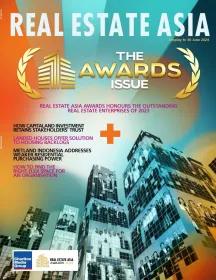
Focusing on tax policies is key in building resilient economies
Michael Velten turns the spotlight on Singapore increasing its tax rates.
A real estate tax expert honed by his 35 years of industry experience, Michael Velten lends his knowledge on taxation laws and management as he joins the panel of judges for the Real Estate Asia Awards 2022.
He is a real estate tax partner with Deloitte Singapore and is the firm’s Southeast Asia investment management and real estate leader. His perspective on the Asian industry comes from his 30-year career in Asia, after having been based in Kuala Lumpur, Hong Kong and Singapore where he currently resides. Michael has worked on real estate transactions across the region, including post-exit tax audits, fund structuring, and investments.
Here is Real Estate Asia’s quick chat with Michael:
What developments have been made with regard to taxation laws and management over the years, especially during the pandemic?
It has been a really interesting period. COVID-19 impacted government revenues and saw an increase in spending. Generally speaking, the response in the region has been an increase in taxes and a focus on compliance – e.g., in Singapore, there will be an increase in the rates of GST, personal income tax, property tax, and carbon tax. Tax authorities continue to invest in new IT systems and tax compliance; including via enhanced taxpayer services (e.g., ease of compliance and tax payments). In Indonesia, the VAT has been broadened and the VAT rate increased. A new tax amnesty has been introduced. In some countries, we are seeing an increase in tax audits.
Whilst revenues are starting to return to pre-COVID levels, the focus on tax policy and compliance will likely continue in order to meet spending needs (e.g., health) and build more resilient economies.
At the same time, the international focus on corporate tax fairness continues – the Inclusive Framework is working to implement the OECD’s BEPS 2.0 (or Pillar 1 and Pillar 2) initiatives. The latter (i.e., Pillar 2) will see the implementation of a 15% global minimum tax. This will affect MNC groups with a turnover of €750m.
In the 2022 Budget, Singapore announced that it will introduce a 15% domestic minimum tax (to be called the Minimum Effective Tax Rate or “METR”). This means that Singapore will collect the 15% tax, rather than the MNC parent location. Pillar 2 is an important development for jurisdictions, such as Singapore, that offer tax incentives to attract investment. In very broad terms, Pillar 2 may in many circumstances negate the benefit of the tax incentive.
That said, countries will continue to position their economies to attract investment and business activity. In Singapore, investment and wealth management is a priority and we continue to see new Funds and Family Offices being established in, and managed from, Singapore. The resident fund exemption schemes available to Singapore managed funds and family offices underpin this activity.
What are the challenges and opportunities for the real estate industry today? How will these challenges shape the future of the industry?
One of the biggest challenges faced by the real estate industry today is keeping up with digital transformation. Buildings are no longer defined by their physical space but are increasingly defined by the systems they provide to boost their occupants’ productivity at the lowest cost and with the least environmental impact. This is also in line with the emergence of ESG being a focus in recent years.
Industry players can adopt Real Estate-as-a-Service (REaaS), an approach which combines strategy, technology, and data to deliver digital and physical services (not just spaces) to tenants and users. To fully exploit the potential of REaaS, companies will need to double down on their investments in smart building enhancements, including sustainable and energy-efficient properties, dynamic building designs, and flexible leasing models.
Companies that expand their portfolios with smart buildings (including sustainability-certified buildings), as well as venturing into technologies such as cloud computing and storage, blockchain, robotic process automation, artificial intelligence and data analytics would be able to separate themselves from the competition. However, common roadblocks to achieving this would be the complexity of technology implementation and the lack of necessary talent. Moving forward, real estate leaders would also need to work closely with third-party technology providers or specialised property technology players in achieving breakthroughs.


















 Advertise
Advertise


